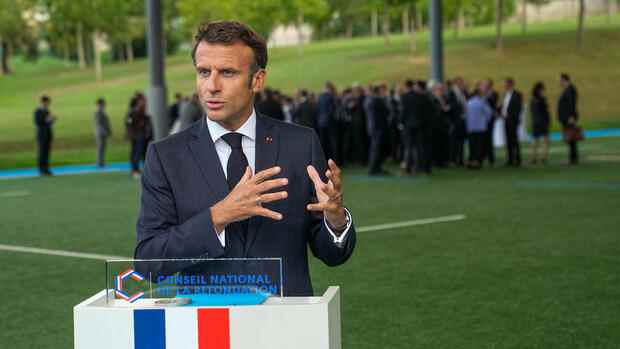Now Macron wants to bring the country together with a consensus offensive in times of crisis – but the “National Council for Reestablishment” threatens to become a soliloquy of his center alliance.
All opposition parties have declined the invitation, with rejection ranging from Marine Le Pen’s right-wing Rassemblement National to left-wing populist Jean-Luc Mélenchon’s Indomitable France party. A number of trade unions also stayed away from the Reform Council’s opening event in Marcoussis in the Paris region on Thursday.
The business association Medef and representatives of the local authorities, however, decided to take part.
“The door is still open,” Macron said. However, those who were absent could not complain later that they were not involved. “It was her decision.” The reactions to Macron’s initiative show once again how hardened the fronts are in France. The second largest economy in the EU is in a political deadlock.
Citizen participation desired
The President’s idea was to bring together representatives of all political forces in the country, the social partners, the cities and municipalities, business and civil society. The debate should then revolve around “reindustrialization and full employment”, around schools, the health system, the energy transition, and the aging of society.
On Thursday, Macron said that given the country’s challenges, “all actors must work together”. The aim is to “create a consensus”. Citizens could also take part in the debates in the Reform Council via an online platform. Individual results could be presented to the population in a referendum at the end. “I’m not ruling anything out,” said the head of state.
Macron let the French know that he had learned from the criticism of his administration. He is concerned with “transparency”, “openness” and the “revival of democracy”.
However, his opponents see the initiative as a move to avoid the decision-making process in parliament with cloudy debates, which the president has to face after losing the absolute majority in the National Assembly.
Mélenchon derided the president’s plans as a “big blah blah”. The Rassemblement National spoke of “fraud” and “another thingy body” in which one did not want to participate. The conservative Republicans, Socialists and Greens worded their rejection more politely, but they are just as resolute in rejecting the council.
Even in the president’s camp, the initiative is not necessarily met with enthusiasm. Macron’s former Prime Minister Édouard Philippe was also absent on Thursday – the mayor of Le Havre cited a long-planned trip to the francophone Canadian province of Québec as the reason.
Precarious situation expected in autumn and winter
In the French media, Philippe’s environment was quoted as saying that he was “absolutely not” convinced of the Reform Council. Philippe founded his own party a year ago, which is part of Macron’s center alliance. But the popular politician is seen as a rival and possible heir to the president if he is unable to stand for re-election after two terms in 2027.
It is not the first time that Macron has tried to get off the political defensive with a national dialogue. In early 2019, following the Yellow Vest protests, which began as a movement against higher fuel taxes and became a rallying point for all dissatisfied, the President invited his compatriots to a “big national debate”.
The situation could get similarly dicey for the president this fall and winter. Mélenchon has already threatened to take dissatisfaction with inflation onto the streets. Macron’s government has passed generous purchasing power aids: According to the French Ministry of Finance, the cap on electricity and gas prices and the tank discount alone have cost the state around 24 billion euros so far. That is about one percent of the gross domestic product.
The reform of the pension system, which the President intends to tackle in the coming months, also harbors political explosives. The question of whether the French should retire later is particularly controversial.
It is questionable whether the government will be able to implement its plans without its own majority in parliament: Macron had already tried to reform pensions during his first term in office. After massive political resistance and months of strikes, the law never passed.
More: The big barter: How Germany and France want to master the energy crisis together
